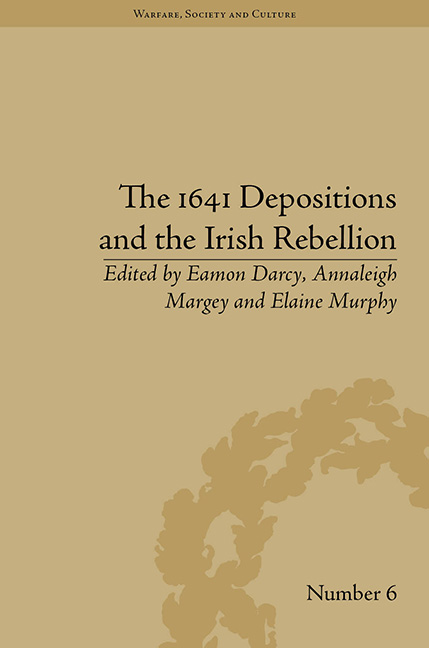Book contents
- Frontmatter
- CONTENTS
- Dedication
- Acknowledgements
- List of Contributors
- List of Figures and Tables
- List of Abbreviations
- Preface
- Introduction
- Part I The Outbreak of the Rebellion
- Part II Social Aspects of the Rebellion
- Part III Political and Military Aspects of the Rebellion
- 9 ‘Holy War’? Religion, Ethnicity and Massacre during the Irish Rebellion 1641–2
- 10 Siege of Duncannon Fort in 1641 and 1642
- 11 1641 and the Shaping of Cromwellian Ireland
- 12 The Trial of Lord Maguire and ‘Print Culture’
- Conclusion: The Rebellion in Text and Context
- Notes
- Index
11 - 1641 and the Shaping of Cromwellian Ireland
from Part III - Political and Military Aspects of the Rebellion
- Frontmatter
- CONTENTS
- Dedication
- Acknowledgements
- List of Contributors
- List of Figures and Tables
- List of Abbreviations
- Preface
- Introduction
- Part I The Outbreak of the Rebellion
- Part II Social Aspects of the Rebellion
- Part III Political and Military Aspects of the Rebellion
- 9 ‘Holy War’? Religion, Ethnicity and Massacre during the Irish Rebellion 1641–2
- 10 Siege of Duncannon Fort in 1641 and 1642
- 11 1641 and the Shaping of Cromwellian Ireland
- 12 The Trial of Lord Maguire and ‘Print Culture’
- Conclusion: The Rebellion in Text and Context
- Notes
- Index
Summary
It is a commonplace in historical scholarship that the English understanding of what occurred in Ireland in 1641 helped to shape the severity of the conquest and the land settlement visited on the country after 1649. Among many other concrete connections, we have Oliver Cromwell's own words from 1650: ‘we are come to aske an accompt of the innocent blood that hath been shed, and to endeavour to bring them to an accompt … who, by appearing in arms, seeke to justifie the same’. A decade later, those seeking to defend the recent dispossession of Catholic landowners and their transplantation to Connacht insisted that ‘since above 300,000 Protestants were murdered without provocation… who could blame them for putting those Irish … into such a part of the kingdom, as might most probably confine them from the like wickedness in the future’? There were countless other contemporary instances in which the alleged 1641 massacres were cited as justification for the treatment doled out to Catholics. Yet problems quickly arise if we attempt to discern exactly what information and precisely which publications informed the views and the policies of men such as Cromwell and bodies such as the English parliament.
The explosion of printed material and the tangled complex of personal contacts that linked Protestant Ireland to London certainly offered innumerable channels through which English political and military responses to the Irish rebellion could be influenced. In their efforts to cut a path through this labyrinth, historians have understandably emphasized the contemporary importance of certain well-known publications. For example, Micheál Ó Siochrú and Toby Barnard have quite reasonably linked Cromwell's understanding of the Irish situation to the content of John Temple's infamous History of the Irish Rebellion published in 1646. This essay reassesses the contemporary significance of two further works to which historians have frequently drawn attention. The first, A Remonstrance of Divers Remarkeable Passages concerning the Church and Kingdom of Ireland, was published in London in 1642, while the second, An Abstract of Some Few of those Barbarous Cruell Massacres and Murthers of the Protestants and English in Some Parts of Ireland, appeared a decade later.
- Type
- Chapter
- Information
- The 1641 Depositions and the Irish Rebellion , pp. 155 - 168Publisher: Pickering & ChattoFirst published in: 2014

